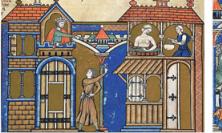Peter Edmonds SJ reflects on the daily readings for the fourth week of Advent.
19 December: Annunciation to Zechariah
Judges 13:2-7, 24-25; Luke 1:5-25
‘Then there appeared to him the angel of the lord, standing on the right of the altar of incense.’ (Luke 1:11)
We may be surprised by the beginning of the Gospel of Luke, which we hear today. This gospel is known as the gospel of the Gentiles, yet its beginning is steeped in the atmosphere of Judaism and its scriptures. The language in the Greek original resembles that of the Greek translation of the Hebrew Bible. The God who has been at work in the history of his people, is again responding to their needs.
In the past, he had displayed his mercy in granting children to parents past the age of child bearing. The patriarch Isaac had been the born to Abraham and Sarah; the judge Samuel had been born to Elkanah and Hanna. God had sent his angel to Hagar, the mother of Ishmael, and to the mother of Samson to announce the birth of their sons. The annunciation to Zechariah had greater sanctity because it took place in the Temple in Jerusalem, the holiest place in the holy city. Zechariah should have welcomed all this, but he did not. He was struck dumb; the people waiting outside never received the blessing for which they were waiting.
Our gospel passage begins with a mention of King Herod of Judaea, but he is not mentioned again. The one who is really king is the God behind the story. This teaches us to watch out for the active presence of God not only in the story of Jesus that Luke relates in his gospel, but in our lives and in our history.
Prayer
Father, Zechariah was a priest in your service, privileged to be the father of John the Baptist. May we imitate him in his practice of prayer; may we not fall short as he did in responding to your word in whatever form it comes to us. Through Christ our Lord.
20 December: Annunciation to Mary
Isaiah 7:10-14; Luke 1:26-38
‘“I am the handmaid of the Lord,” said Mary, “let what you have said be done to me.”’ (Luke 1:38)
We are often frustrated when we find a page missing in what we are reading or when we hear only one side of a conversation. We have much to learn about Mary and the child whose mother she is to be from Luke’s report of Gabriel’s message to her, but we may learn even more if we contrast this account with that of the annunciation to Zechariah which preceded it.
This time the angel Gabriel is mentioned at the beginning of the narrative and is said to be sent by God. Our God is a God of initiatives. God’s angel goes to a place never recorded in the Old Testament, far from the holy city of Jerusalem. He speaks not to a Temple priest but to a young unmarried woman. She and the child whose birth is announced are described in language far richer than that applied to Zechariah and to his child John in the previous annunciation story. Gabriel tells Mary: ‘The Lord is with you’. He describes her child as, ‘Son of the Most High’. In fact, Gabriel has much more to say about both.
Luke gives us this information because he wants his Christian audience to know how ‘well founded the teaching is which you have received.’ In the light of this story, he surely wants us respond as Mary did to the message of the angel: ‘I am the handmaid of the Lord.’ The angel’s message is directed to all of us.
Prayer
Father, we venerate Mary not only as Queen of Heaven but also as the perfect Christian disciple. May we too be covered by the power of the Most High and through her prayers and in her company help bring Christ to birth in our unbelieving world. Through Christ our Lord.
21 December: Elizabeth greets Mary
Song of Songs 2:8-14 (Zephaniah 3:14-18); Luke 1:39-45
‘Yes, blessed is she who believed that the promise made her by the Lord would be fulfilled.’ (Luke 1:45)
Of our four gospels, it is Luke’s that is best described as the gospel of persons and of personal relationships. Today we have two such relationships described. The first is predictable in the light of what we have heard so far in this gospel. It is between two women: Elizabeth, who is to be the mother of John the Baptist; and Mary, who is to be the mother of Jesus. The second relationship is original and more surprising; it is between the two children who are yet to be born.
The last we heard of Elizabeth were the words she spoke thanking the Lord for taking away ‘the humiliation she suffered among men’. The last we heard of Mary were her words to the angel, ‘let what you have said be done to me’. Now they meet and it is Elizabeth who speaks first. Her words are inspired by the Holy Spirit, and they give us the nucleus of the prayer spoken by millions over the centuries: ‘Of all women you are the most blessed and blessed is the fruit of your womb’.
Meanwhile we are told twice that Elizabeth’s child leapt in her womb. The joy that the angel had promised Zechariah, is now shared by his son soon to be born, because of the child to whom Mary will shortly give birth. The peace, happiness, salvation which Isaiah looked forward to centuries before, find expression in the encounters between two women and their children. Let us welcome and imitate them.
Prayer
Father, as soon as Elizabeth heard the greeting of Mary, she was filled with the Holy Spirit and in return she greeted Mary. May our knowledge of Mary and our intimacy with her in prayer, build us up as true temples of the Holy Spirit. Through Christ our Lord.
22 December: Mary magnifies the Lord
1 Samuel 1:24-28; Luke 1:46-56
‘Mary said, “My soul proclaims the greatness of the Lord.”’ (Luke 1:46)
Thanks to Elizabeth, the mother of John the Baptist, we possess key phrases of the ‘Hail Mary’ prayer when we address Mary, the mother of Jesus, in our devotions. In this prayer, we ask this mother of Jesus to pray for us. Elizabeth does not ask Mary to pray for her, but in response to the words which Elizabeth spoke under the inspiration of the Holy Spirit, Mary speaks her own prayer which we know from its first words as the Magnificat.
It is a model prayer for a number of reasons. Like the prayer which Jesus makes to his Father and the prayer which he teaches his disciples, it begins with the praise of God. Mary’s prayer links her with the traditions of her people. Its structure reminds us of the prayer of Hannah, the mother of Samson. It concludes with an appeal to the patriarch Abraham. Twice it celebrates the mercy of God; it recalls past promises to her ancestors. As to its content, its words about the rich and the poor look forward to the Beatitudes and parables of Jesus in the gospel story which follows.
When we call upon Mary, whom we address as ‘mother of God’, to pray for us, we may be confident that she continues to make this prayer in the presence of her Son who makes intercession for us at the right hand of God. She exercises her role as Mother of the Church by persevering in her prayer as a perfect Christian disciple.
Prayer
Father, every evening your Church turns to you in her official prayer with the Magnificat of Mary. May we make Mary’s sentiments our own, so that like her, we may be people who hear the word of God and put it into practice. We make this prayer through Christ our Lord.
23 December: The birth and naming of John the Baptist
Malachi 3:1-4, 23-24; Luke 1:57-66
‘The father asked for a writing tablet and wrote, “His name is John”.' (Luke 1:63)
In the days before Christmas, as if in a sort of art gallery, we gaze at various scenes preparing us for the birth of Jesus. Today we contemplate the birth of the Baptist and his naming, the sequel to the annunciation to Zechariah and the visit of Mary to Elizabeth, John’s mother.
We know Zechariah from his meeting with the angel. We know Elizabeth, his wife, from her meeting with Mary, mother of Jesus. We know about John, because while still in the womb, he had leapt for joy at meeting the future messiah, still unborn. But there are also those identified as ‘they’ in the story, neighbours and relatives of Zechariah and Elizabeth.
We may pause over these unnamed people. We concentrate on the words used to describe their activity. They hear about what has occurred and share the joy of the parents. They contradict Elizabeth when she wants to name the child John. They demand to hear the opinion of the father, dumb though he is. They cannot gainsay what he orders. They are amazed; their amazement turns into awe or even fear, because they recognise the activity of the divine. This fear penetrates their hearts. The heart of these people leads to the question: ‘What will this child turn out to be?’ We know the answer from elsewhere, especially in our first reading from the prophet Malachi who announced that God would send Elijah the prophet to prepare a way before him.
Prayer
Father, St Ignatius urges us, as we contemplate gospel scenes, to look at the people and to listen to what they say. May these neighbours and relatives of the parents of John the Baptist help us appreciate all the more the meaning of the Christmas story. Through Christ our Lord.
24 December: The fidelity of God
2 Samuel 7:1-5, 8-12, 14, 16; Luke 1:67-79
‘Blessed be the Lord, the God of Israel, for he has visited his people, he has come to their rescue.’ (Luke 1:68)
Some people get overshadowed in a story. In a family, one sibling often becomes better known than another. At school, one class member is famous while another with talent remains in obscurity. Likewise, we may well know about the visit of the angel Gabriel to Mary, the mother of Jesus, and about the greeting which Elizabeth gave her when they met, since we recall them every time we pray the Hail Mary. But the angel’s previous visit to the priest Zechariah, and his statement of doubt which left him dumb, may be much less familiar.
But his dumbness did not last, and he was able to speak one of the great prayers of our gospels, so impressive that it now forms part of the official Morning Prayer of the Church. Like all good prayers, it celebrates the qualities of God and gives eloquent expression to our needs. We praise God above all for his fidelity to his promises. Among these was the promise made to David which we hear as our first reading. As for our needs, we all pray that we may spend our days serving God in holiness and virtue, and that we may walk in the way of peace.
Zechariah begins by expressing his joy because God has visited his people. Visits demand hospitality. In the gospel that follows, many people give hospitality to Jesus. We pray that we may be numbered among them by proving hospitable to God in all the situations in life in which he visits us, whatever form this visit may take. In his canticle, Zechariah gives us a prayer to pray and a song to sing.
Prayer
Lord, who visited Zechariah and Mary through an angel, make us conscious of the many ways in which you send messengers to us in our lives too, and may we, like them, respond in words and deeds which are true expressions of our hospitality. We pray this through Christ our Lord.






